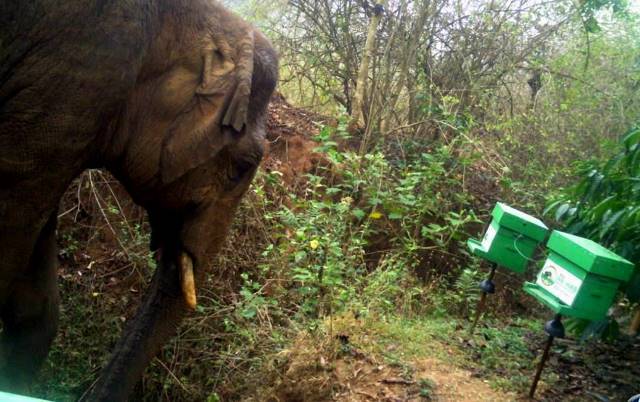Sting Operation: Odisha’s New Project To Employ Bees Against Jumbos

Bhubaneswar: The Odisha government is soon going to launch a novel project to ward off the growing human-elephant conflicts.
Principal Chief Conservator of Forests (PCCF), Wildlife, Sashi Paul said that taking note of the rising incidents of human-elephant conflict mostly in the elephant corridors, a novel project RE-HAB (Reducing Human-Elephant Attacks Using Bees) is being launched in the Athmallik Forest Division in Angul district soon.
Giving details of the project which is jointly being taken up by the Forest and Environment Department and the Khadi and Village Industries Commission (KVIC), he said beehive boxes would be placed on the periphery of the forest. A wire will be tied to the beehive boxes. When the elephants pass through this route and stamp on it, the honey bees will wake up and start attacking them and driving them back to the forest.
Similar project has succeeded in South Africa and other countries, said Paul and added the project has yielded success in Uttarakhand and Karnataka. Hence the Odisha government has decided to launch it on a pilot basis in Athmallick. “We have had a meeting with the people of three villages on the periphery of Athmallick Forest Division and they are ready to cooperate with us for the successful implementation of the project,” the PCCF added.
He said as the incidents of human-elephant conflicts mostly occur during the harvest season between September and March, the project will be launched at that period. “We will closely monitor and study the impact of this project on the elephants,” he pointed out.
Notably, the state government has decided to implement the project after the failure of projects like solar fencing and railway track fencing.
The PCCF further said along with this project, the Forest Department will kick off Gaja Sathi Yojana by involving Van Suraksha Samiti members to provide early inputs about the movement of elephants.
“As decided, five members of each Van Suraksha Samiti will be engaged as Gaja Sathsi and will be provided with firecrackers, lights and other equipment to track and drive the elephant herds from the human habitations. Besides, each Samiti will be provided with an assistance of Rs 25,000,” Paul said.
“In order to track movement of the elephants, it has been decided to put radio collars on the neck of the elephants in Chandaka Sanctuary, Badampahar Forest Range and Similipal National Park in Mayurbhanj district. The Indian Institute of Science (IIS), Bengaluru has been given the responsibility to put the radio collars on three elephants this week,” he informed newsmen.

Comments are closed.